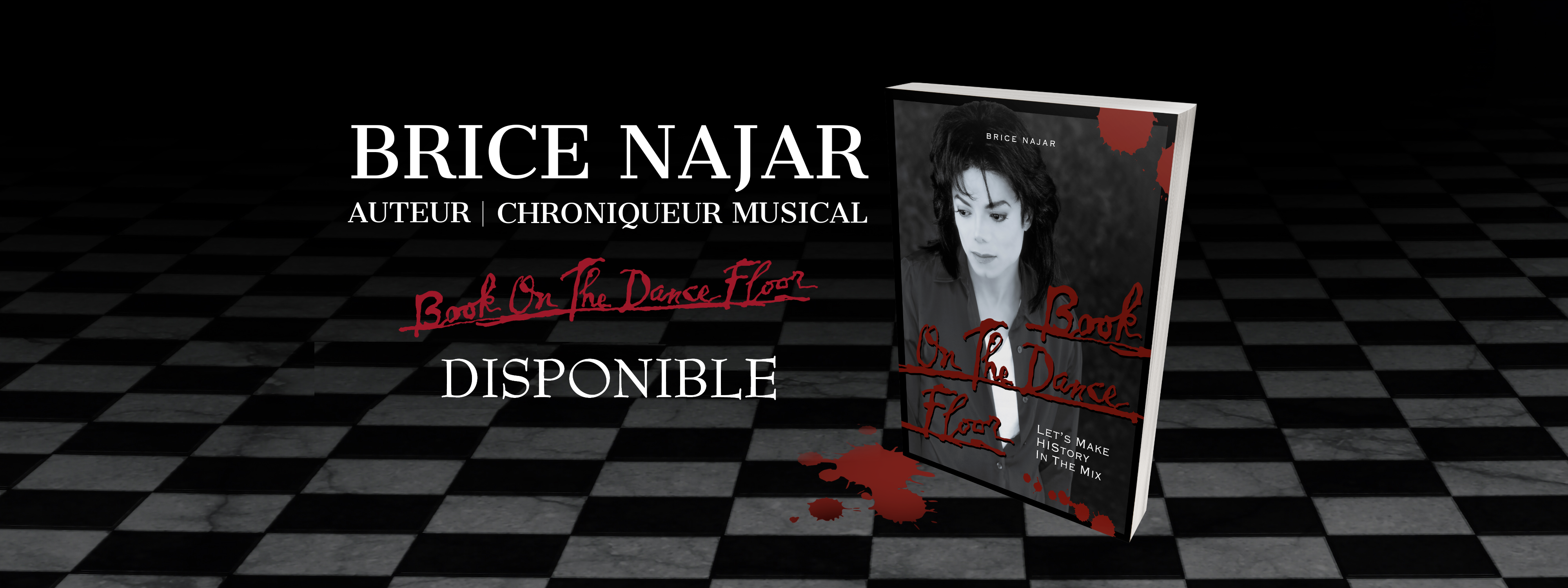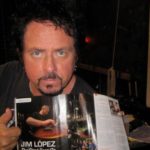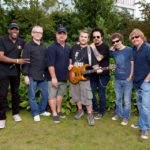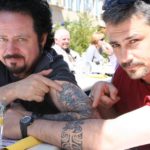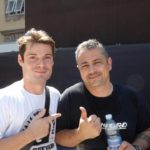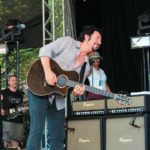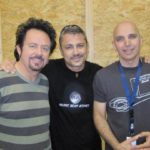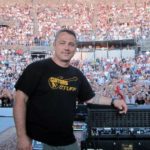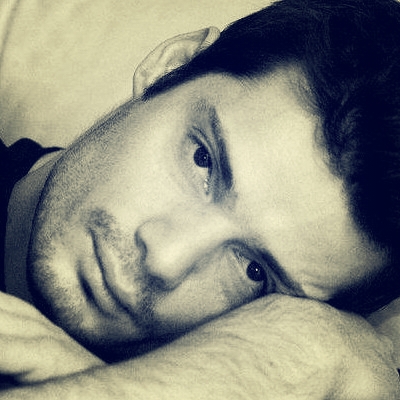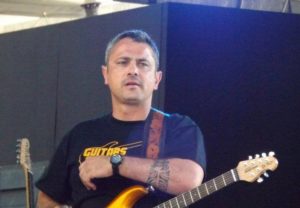
.
Jim Lopez
As a Toto fan, it would have been difficult for me not to notice Frenchman Jim Lopez’s experience as Steve Lukather’s guitar tech. Before the year 2010, I knew Jim through the internet, including the Totoweb forum, but I was far from imagining the beautiful adventure that awaited him. The main interested person talks about an American dream regarding this experience and he kindly agreed to answer my questions to share it with you.
Can you tell us how your passion for guitar started and what had your career been as a musician before working with Steve Lukather?
I started playing the guitar at the age of thirteen because this instrument was present at home, since my father was also an unpretentious guitarist. To tell the truth, I had a revelation after discovering Mark Knopfler and Eric Clapton on a TV show. It should be noted that I was brought up in a Rock’n’Roll environment with Jimi Hendrix, the Beatles, the Rolling Stones and above all Pink Floyd. I have always been into this musical genre. I started to do it seriously and I did a lot of things like concerts, but not planning to make a career. On the other hand, I have always wanted to know this instrument to the point that it became a passion. I was really interested in the sound of the electric guitar. Over the years, I tried to understand why some guitarists sounded a certain way and some did not. This could come from the guitar and its equipment, and I have always been in this perpetual quest for the sound of the electric guitar. So I started building my own system to get a sound similar to those of David Gilmour and Steve Lukather, my two main influences since the 80s. Then I joined a band, a trio called Shunt, and we’ve been playing together for over 25 years now. We recorded a few albums and we had our moment of glory in the early 90s with a few appearances on radio and television. Quite frankly, I was not really interested in being in the spotlights – I’d rather remain in the shade. I am pretty shy and not the one who will put himself on a stage.
My priority was to keep my passion intact by not making a career out of it. It seems to me that if I had had to make a living out of it, I would have experienced things in a different manner at the risk of getting tired of it.
You mentioned Steve Lukather as one of the influences you’ve always had. Any anecdotes from the time you were « only » a fan never foreseeing you would work with him one day?
Yes, I have an anecdote with Luke that remains unforgettable to me. One day, I went to see him on a tour with Los Lobotomys in 1994. As a reminder, he played with Simon Phillips, David Garfield and John Pena that year, and it was an amazing show. Steve Lukather was so totally into it that he was jumping backwards into the audience and I happened to be standing right in front of him. On a few occasions he landed on me, and even found himself sitting on my face. A few years later, I told him about it although he did not remember it at all and we had a good laugh!
How did you eventually join the Music Man promo tour with Aymeric Silvert’s band over the spring of 2010?
As a guitar and sound enthusiast, I used to visit dedicated forums to answer many questions and so I presented my equipment which was quite similar to that of Luke. It was on the Music Man forum that I met guitarist Aymeric Silvert and one day I went to see him play in Lille. He was the opener at Richie Kotzen’s concert so I congratulated him for this great event. He told me that another large-scale project was coming and that he would surely need me. I went home to Bordeaux, without knowing much, for Aymeric had remained quite mysterious. He called me back a few months later saying that his project was going to come up and asking if I would lend my equipment to the guitarist he was going to play with. I immediately accepted without knowing who the musician was, because Aymeric is someone I trust. He ended up telling me it was Steve Lukather and I was knocked for six!
So I thought to myself that I was going to build a system that was similar to his – that is Bob Bradshaw’s rack system – and I wanted to get as close as possible to this equipment so that Steve could feel comfortable with it. This implied similar pedal locations with the same kind of amplifier.
A few weeks later, once the system was finalized, Aymeric called me to say that Luke also needed my services as a guitar tech. Initially, I was only going to lend the equipment and now, I was doing this tour with him!
So can you tell us more about that first collaboration with Luke?
At first, I was feeling totally fascinated by this meeting and, I must confess, pretty intimidated and stressed out. Although I spoke very little English at the time, Luke immediately put me at ease because he is an extraordinary person. Rapidly, we understood each other and I identified his needs. The point was to be able to anticipate them in order to save time and get things done. I knew he was a perfectionist who necessarily had legitimate requirements. I wanted to anticipate any request he might have, because I was also pretty demanding with myself. I was still a fan wishing to make a good impression on him for this tour. I did not want him to be disappointed by his coming to France for these shows. Finally, the tour went very well but I just thought that I had lived my dream by meeting and working with my idol. In my mind, the adventure was over, but at least I could tell that I had been Steve Lukather’s guitar tech once in my life!
What about the moment when the great guitar player offered to hire you on his coming tours ?
A few months later, I sent him a message saying : « Enjoy your holiday! » – that was August 2010. He answered on my Facebook page, in full view of everyone, asking if I would be available in November to participate in his next solo tour. At first, I had not seen his message and when I logged in, I got loads of notifications from my friends, who were completely excited and encouraged me to accept. I did not understand anything about it and then I finally realized that there was this message from Luke about becoming his guitar tech. Of course, I wrote back to Luke in private messages, but that’s how this first request happened and it remains an unforgettable and funny memory!
I was all the more stressed out since this time, I was going to be the only French guy on this tour. At the time, I was working at Michelin so I took a three-week leave for the shows in Europe. On the second day, he asked me to quit Michelin for good and sign a contract with him to go on tour around the world. I was so surprised I could not give a positive answer at first. So from time to time he would come back to me to see if I had made a decision, but I wanted to talk to my wife before, because I also had a family life with children and work. It was not easy …
We finished the tour with one last date in England and I had still not given him my answer, but I ended up calling him back two days later to tell him I agreed. So I was there in Helsinki to start the year 2011 that was an extraordinary one!
Did he make it clear from the beginning that you would also work with him on the Toto tours?
Yes, he was very clear on that – he wanted me to be with him on every performance, whether they were solo or with his band. As a fan and enthusiast, I was really touched by that – it really pleased me. On the other hand, I was a little scared of making music my job, because it implied major changes in my life. Especially when I started by working with one of the greatest guitarists on the planet – it was the real American dream!
Beside the technical aspect, would you say that your human relationship might have influenced his choice and decision to hire you?
The complicity we had, the way we forged links, it all began on this second tour together. We really got to know each other at that point. Then, when I resigned from Michelin to work with him, it grew stronger and we became good friends. You have to be close to someone like him, for he is an exceptional human being. When you are his right arm on the technical level, you have to anticipate everything and go out of his way for him. He is someone I have come to love because we’ve spent so much time together. Sleeping on the same bus, and in the morning having breakfast with him eventually made his presence a daily routine.
The complicity came gradually because, on the first tour with Aymeric, we could not feel it immediately. But as soon as I signed with him, I met Steve Weingart, his musical director, and his drummer Eric Valentine, and I was introduced to his whole team and to the connection they all had, so I became more comfortable and it happened naturally.
During that first solo tour in November 2010, you probably had more responsibilities that on the one you did with Aymeric, hadn’t you?
Yes, it was completely different. For the first time, I was using Luke’s equipment and I was surprised because it was not what I had imagined. I was expecting something more meticulously taken care of but it was not in very good condition. A few things had to be done like adjusting some guitars to the sound that he likes. Regarding the rack, I did a few things too so first it was some kind of a maintenance job in the first weeks, and I did not expect that. As a result, it was a bit difficult for me in the early times. Then he completely changed his approach in terms of equipment and everything became easier because he knew where he was going – actually he was going through a period of transition in this field. He changed the type (I could even say the concept) of his guitars, with passive and active microphones. Regarding the sound, he played with much less Gain (that is the level of input of the pre-amp guitar) in his solos since he used to add pedals to be able to amplify his own sound. He also used to play with a HF (a wireless system) and those things polluted his sonorities. Now it is much more organic, purer and punchy, going to the basics. People may like it or not, but that’s really what he wanted and he succeeded in getting it. He’s always worked in this direction, because he wants to simplify his system. He is someone who is constantly changing, both in the way he plays and in his quest for sound. It is also true regarding his compositions and texts – he is a musician who knows how to evolve while listening to others.
In practical terms, can you tell us what it means exactly to be Steve Lukather’s Guitar Tech? I remember seeing you loading and unloading the equipment during the tours and it seemed like it was hard work!
Yes, it’s hard work, but it’s not the end of the world! (laughs) You really have to be focused well before the show, because it involves a big preparation beforehand. During the soundcheck, everything must be perfect – and even if there is no soundcheck actually! The stress is always there, because even throughout the concert, I used to listen to each and every note Luke played in order to detect and anticipate the slightest problem. It could be due to any technical aspects, like the pedals, the cables or the guitar itself. I always had to be there and respond if it was necessary. That really is the role of the guitar tech – to be at the artist’s service and become his shadow.
For instance, changing the guitar depending on the song during the show was also one of your tasks. Can you tell us more about this?
Yes, this was also decided in advance. The guitars are chosen according to their different tunings knowing that they will be played for 2 or 3 songs. For example, on one of the final tracks, he might play a very flashy solo so I would keep the guitar fresh for the right track. All of these things are part of a massive preparation work behind the scenes.
Have you ever gone through major technical problems during the shows?
No, I never really had such problems, but I do remember the only one I experienced. The concert was being broadcasted on German television. Luke still played with his HF system at the time, and everything went fine during the soundcheck. Then, the cameramen came in to shoot the show and with all their intercoms (systems with headphones and microphones) they created interferences with Luke’s equipment. We did not see the thing coming, because everything happened in the middle of the show. I heard a crash and Steve instantly looked around. I did not hesitate a second since I always kept a backup cable so I plugged it to his guitar and unplugged the HF system. There was a moment of hesitation that did not even last ten seconds. This is the only technical problem I had with him during a show, except for another one that is coming to my mind. He had spilled water on his pedal and I had to wipe it off while he was still playing. So he started sitting on me with the help of Joseph Williams! I was the clown of the group during the show! (laughs)
Initially, you are a fan of Steve Lukather. Did you have to put your own feelings aside in order to deal with things in a professional manner?
Being his guitar tech has never stopped me from being a fan. During the shows, I had to listen to his music because it was part of my job, but it was also a pleasure and I never got tired of it. I literally hung on his notes and I think I listened to him playing like no one as a tech guitar and a fan of his. I did not miss anything he did, and even if he was not aware of it, everything he was doing was really amazing. The way he would question himself every day and put himself in danger was crazy. It’s a real endangerment because he would dive into solos and we would not know where he was going to. He would try things and always find the right direction! He is very good at improvising and transmitting things to his audience when he plays! He is a really gifted man and being a fan has never interfered with the professional aspect and vice versa!
You were also Steve Lukather’s guitar tech on the Toto tours. Did this involve similar equipment and tasks knowing that there is more logistic needed than on solo tours? What are the differences between the two?
The solo tours were a bit more tiring because Toto is a bigger structure with more technicians and so I had much less handling to do. However, on solo tours, we would all travel on the same bus whereas with Toto, the group and the technicians travelled separately. As a result, the atmosphere was different.
Regarding Luke’s equipment, whether with Toto or solo, it is exactly the same, although the number of guitars can vary according to the set-list.
Sometimes, we did some events without his equipment, just a guitar and some amps and pedals I had found and brought along, but he still sounded like a god because the sound is in his fingers. He’s a magician!
On the Toto tours, you also had the opportunity to hang out with the other members of the band, and beforehand for the rehearsals in Los Angeles. Any anecdotes or memories you could share about these moments?
It was an extraordinary adventure and it would take me ages to tell about all those moments! When I came into the rehearsal room for the first time and saw Steve Porcaro coming to me like I did not know who he was, it was just amazing ! Same thing happened with Simon Phillips who introduced himself to me while I am a complete fan of his…
Our relationship was amazing because they are all really nice people. I also worked for Nathan East and this guy is a delightful, so lovely. All these people have a phenomenal talent, some charisma and intelligence with kindness in addition. It was really great to work with all of them, both the group and the whole technical team. It was bliss, really!
When I arrived in Los Angeles for the rehearsals, I had an appointment with Toto’s booking agent, Galen Henson. We met at the airport and he drove me to the hotel. When we got to the parking lot, I saw Luke who was waiting for me with his arms folded, leaning against his car. He said there was no way I was staying at the hotel and he invited me to stay at his place. That’s how I spent a fortnight at his house in Hollywood. We would run together in the morning and have Thai food in the evening. He was very giving and welcoming. He is truly a generous and extraordinary guy!
For the first show, on June 21st 2011 in Brussels I remember Steve Lukather used a cable plugged to his guitar and not the usual HF system. Can you explain how he came up with this choice?
When we started rehearsing in Los Angeles, Steve had just changed the concept for his equipment. He was no longer using a rack system but a pedal board with two amps. As a result, he began to rehearse with a cable, but still wanted me to install the HF system. Once it was done, Luke asked me to put the cable back, because he thought it sounded much better. As a result, he opted with it and I made this long cable for him to use on the tours.
As a guitar technician and a fan of his playing, you knew Steve Lukather pretty well. Would you have been able to work with another renowned guitarist without being a fan of his?
I don’t think so, for several reasons. To make it simple, I would never have agreed to be another musician’s guitar tech because I could never have experienced the same complicity I had with Luke…
Being Steve Lukather’s guitar tech necessarily implies some kind of notoriety among the Toto fans. How did you manage it, like the friend requests on Facebook and any other solicitations you probably got?
I have to admit that I found it really weird at first. I didn’t understand why I was getting all these requests and solicitations, but on the other hand, it was nice. Some people just love your adventure and you give them back a little of that affection by publishing pictures of the concerts. Then, you start getting lots of messages with lots of questions, without really having any time to answer them, so it’s not always easy. I remember telling Luke I was having more and more trouble managing my Facebook account, but he told me that communication was part of our job. I had always been in the shade and all of a sudden, I found myself in the spotlights.
Still, it was pretty fun to experience some situations. Sometimes, on tours, people would recognize me on the street and ask me to take pictures with them. Also, everyone called me by my first name during the sound checks. In Japan, I even signed some Toto albums, without feeling really legitimate for it! So I participated in the game even if I know I’m not a star! (laughs)
Did you stay in touch with Steve Lukather? Do you think one day you might work with him again?
Yes, we’re still in touch, and we write to each other from time to time. Every time I have the opportunity to go and see him, I do it with pleasure. Whatever happens, he will remain my friend. Regarding another collaboration, I don’t know. You never know what the future holds, but in the meantime, I know that he has been working with Jon Gosnell for a few years now. I know he’s a great guy, and very dedicated to his job and that they get along very well. So, I don’t see why he would need me. As for me, I am also very busy with my work today. Will I ever work with him again? I have no idea, but I will never forget that he changed my life.
As a conclusion, which memories will you keep of that experience? Was it just like you had imagined it would when you started that adventure in 2010?
For me, it’s the American dream! You are nothing and overnight, you work with the best. Only with Americans one can have this kind of experience. In France, there will always be someone ahead to crush you and prevent you from climbing the ladder. With them, it’s totally different.
I do not have a better memory of this period because I enjoyed this adventure as a whole. I learned a great deal every day, artistically and technically speaking, but also on the human aspect of things. By working with someone like Luke, you have to learn and evolve in your work, because his career and experience are huge with some many anecdotes to share with you.
This is only happiness that one gets to see and discover every minute, and all the great moments help you forget that you miss your own family. One should keep in mind that the Toto group and their team are like a family in itself and everyone is happy to be there ! I found myself immersed in another culture, thinking in another language, and I learned a lot during all those years as Steve Lukather’s guitar tech!
